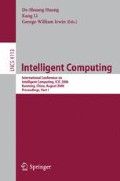Abstract
Benchmarking is a technique that engages and executes a series of measures to change indexes of the Decision Making Unit (DMU) to excellent by using the gap analysis information between the DMU and benchmark. In this paper, a DEA-Benchmarking model based on the theory of maximum entropy is proposed and the conception of Entropy-DEA efficiency is defined. According to the optimization model based on the theory of maximum entropy, the Entropy-DEA efficient DMUs is regarded as benchmarks, which have more advantages and direction than DEA efficient DMUs. The measure method and existence property of Entropy-DEA efficiency are all analyzed in this paper.
Supported by the National Science Foundation of China (No. 70571028).
Access this chapter
Tax calculation will be finalised at checkout
Purchases are for personal use only
Preview
Unable to display preview. Download preview PDF.
References
Fu, Z.Y.: Information Theory: Basic Theory And Application, pp. 35–51. Electron Industry Press, Beijing (2002)
Gu, R.Z.: The New Path of Multiple Objective Decision. System Engineering 9(4), 1–8 (1991)
Zhao, F.: Benchmarking, pp. 5–12. The Textile Press of China, Beijing (2004)
Robert, K.: Niven: The Constrained Entropy and Cross-entropy Functions. Physica A 334, 444–458 (2004)
Diasparra, M., Gzyl, H.: Entropic: Approach to Interior Point Solution of Linear Programs. Applied Mathematics and Computation 143, 339–347 (2003)
Yang, Y.H.: The Quantitative Method in Economy System, pp. 285–327. Jilin science Technology Press, Changchun (2001)
Sheng, S.H., Zhu, Q., Wu, G.M.: DEA Theory, Methodology and Application, pp. 73–144. The Science Press, Beijing (1996)
Wei, Q.L.: Data Envelopment Analysis, pp. 148–203. The Science Press, Beijing (2004)
Author information
Authors and Affiliations
Editor information
Editors and Affiliations
Rights and permissions
Copyright information
© 2006 Springer-Verlag Berlin Heidelberg
About this paper
Cite this paper
Yang, Ys., Li, N., Liu, Hc., Guo, Hp. (2006). A DEA-Benchmarking Optimization Model and Method Based on the Theory of Maximum Entropy. In: Huang, DS., Li, K., Irwin, G.W. (eds) Intelligent Computing. ICIC 2006. Lecture Notes in Computer Science, vol 4113. Springer, Berlin, Heidelberg. https://doi.org/10.1007/11816157_104
Download citation
DOI: https://doi.org/10.1007/11816157_104
Publisher Name: Springer, Berlin, Heidelberg
Print ISBN: 978-3-540-37271-4
Online ISBN: 978-3-540-37273-8
eBook Packages: Computer ScienceComputer Science (R0)

